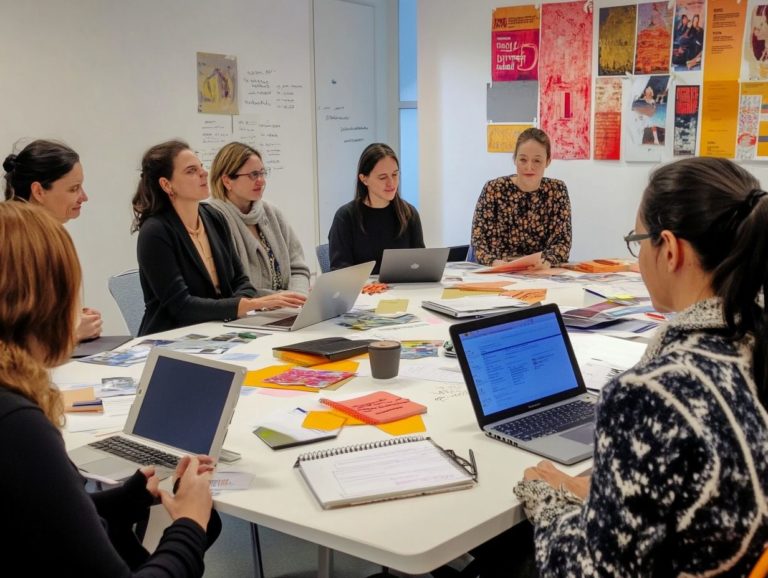Key Competencies for Project Management Professionals
Project management is pivotal to the success of any organization, guiding projects from their inception to their successful completion.
In today s competitive landscape, recognizing the key competencies required for project management professionals is essential. This article delves into the technical, interpersonal, leadership, and strategic skills that distinguish effective project managers.
It also emphasizes the need for continuous development to remain aligned with industry trends and best practices. Join in as you explore the vital skills and strategies that empower project managers to truly excel.
Contents
- Key Takeaways:
- Key Competencies for Project Management Professionals
- Developing and Improving Project Management Competencies
- Importance of Continual Development in Project Management
- Preguntas Frecuentes
- Cu les son las competencias clave para los profesionales de la gesti n de proyectos?
- Por qu son importantes las competencias clave para los profesionales de la gesti n de proyectos?
- C mo pueden los profesionales de la gesti n de proyectos desarrollar competencias clave?
- Cu l es el papel de las habilidades blandas en las competencias clave para los profesionales de la gesti n de proyectos?
- Son las competencias clave las mismas para todos los profesionales de la gesti n de proyectos?
- C mo pueden los profesionales de la gesti n de proyectos mostrar sus competencias clave?
Key Takeaways:

- Effective project management requires a combination of technical, interpersonal, leadership, and strategic skills.
- Project management professionals can improve their competencies through training, education, practical experience, and mentorship.
- Continual development is crucial for project management success, including staying current with industry trends and best practices.
Defining Project Management and its Importance
Project management is a systematic approach to planning, executing, and closing projects. This is essential in today’s fast-paced business landscape.
With the increasing complexity of projects across various industries, skilled project managers are in high demand. Whether you re in construction, IT, healthcare, or marketing, effective project management is pivotal for achieving successful outcomes.
You will find yourself responsible for coordinating teams, setting timelines, and managing budgets while skillfully navigating potential risks.
By leveraging various project management tools, such as Gantt charts (a type of bar chart that illustrates a project schedule) and specialized software, you can streamline processes and enhance communication across your team. Understanding project lifecycle management will empower you to handle each phase from initiation through planning, execution, monitoring, and closure efficiently.
This ultimately leads to improved productivity and higher-quality deliverables that meet stakeholder expectations.
Key Competencies for Project Management Professionals
As a project management professional, you need a diverse array of competencies to navigate the complexities of managing projects and meeting stakeholder expectations. Key skills in your arsenal should include technical expertise, sharp communication abilities, and effective management skills. Additionally, familiarizing yourself with the top project management tools for certified professionals can empower you to lead teams and coordinate tasks with precision.
Cultivating strong leadership skills is essential; these will help you foster collaboration and adaptability in ever-changing environments, ensuring that you successfully deliver on project objectives.
Technical Skills
Technical skills are essential for you as a project manager, encompassing the knowledge and expertise required to effectively harness project management tools and methodologies.
Mastering tools like Microsoft Office and Jira empowers you to efficiently oversee project timelines, budgets, and risks while ensuring operational effectiveness. You must also hone your skills in budget management techniques, which involve not just creating detailed financial plans but also vigilantly monitoring expenditures to keep projects within their allocated budgets.
For example, leveraging software like Excel for financial forecasting can help you anticipate future costs. Understanding risk management strategies is equally vital; this may include employing risk assessment frameworks to identify potential issues early on.
By utilizing methods such as SWOT analysis (a framework for identifying strengths, weaknesses, opportunities, and threats) or risk matrices, you can take proactive steps to mitigate threats, showcasing how a blend of these technical competencies plays a crucial role in driving your project’s overall success.
Dive in and discover the skills you need to thrive in the world of project management!
Interpersonal Skills

Interpersonal skills are absolutely crucial for you as a project manager. They enable effective communication and collaboration among your team members, stakeholders, and clients.
These skills not only help you convey ideas and expectations but also play a significant role in building trust and rapport. Both are vital for fostering smooth team dynamics.
For instance, if you’re leading a software development team, organizing regular check-ins can ensure that communication channels remain clear. This allows your team members to voice their concerns and propose solutions. It creates an environment where everyone feels heard.
In a construction project, promoting collaboration among various contractors can effectively prevent delays and misunderstandings that could derail progress. By prioritizing customer service, you can address client feedback promptly. This ensures that the final deliverables not only meet but exceed expectations.
When you integrate communication, collaboration, and a service-oriented mindset, you pave the way for project success and enhance the overall work environment.
Leadership Skills
Leadership skills are essential for you as a project manager. They allow you to inspire, guide, and motivate your teams to achieve project objectives effectively.
With a strong grasp of team management, agile principles focusing on flexibility and collaboration and change management, you can adapt seamlessly to dynamic environments and drive continuous improvement.
These vital skills cultivate a sense of collaboration and trust among your team members. This is crucial for maintaining morale during challenging phases of a project.
When you embody adaptability, you can navigate unforeseen obstacles with a calm demeanor. This inspires confidence and resilience within the team.
Your strategic decision-making abilities enable you to assess risks, allocate resources efficiently, and steer projects toward successful outcomes. Strong leadership influences timelines and budgets while fostering an environment where innovation and creativity can truly flourish.
Strategic and Business Management Skills
Strategic and business management skills are essential for you as a project manager. They allow you to effectively align project objectives with your organization s overarching goals.
These skills encompass critical thinking and decision-making abilities. You need to be able to prioritize tasks, manage workloads efficiently, and ensure that your projects contribute meaningfully to the organization’s success.
You also need to be able to assess and manage project portfolios. This means evaluating multiple projects within a program to optimize resources and mitigate risks.
For example, when deciding how to allocate funding, analyze potential returns on investment and identify which projects best support your strategic initiatives.
By adopting a portfolio approach, you can select projects not only based on immediate needs but also in alignment with long-term business objectives. This fosters sustainable growth and adaptability in an ever-evolving marketplace.
Developing and Improving Project Management Competencies
If you want to skyrocket your career, developing your project management skills is crucial!
By actively engaging in training and educational opportunities, you can improve your main project management skills.
Gaining practical experience through hands-on projects is also beneficial. It offers invaluable insights into the real-world challenges you ll face.
Remember, continuous improvement is essential to remain relevant in the dynamic landscape of project management.
Training and Education Opportunities

Training and education opportunities abound for aspiring project managers, offering a clear pathway to acquire essential skills and credentials for advancing your career.
The Project Management Institute provides a range of certifications, like PMP and CAPM, that are well-respected in the industry and significantly enhance your software skills, crucial for effective project management.
Numerous reputable organizations offer specialized training programs that dive deep into advanced methodologies, risk management, and stakeholder engagement strategies.
These programs not only bolster your theoretical understanding but also emphasize practical application, ensuring you can seamlessly incorporate software tools like Microsoft Project and Trello into your workflows.
These software skills are vital, as they enable better communication, resource allocation, and tracking of project milestones.
By pursuing these training initiatives, you can jumpstart your project management career and pave the way for successful project execution and leadership roles.
Practical Experience and Mentorship
Practical experience and mentorship are crucial in shaping you into an effective project manager. They offer insights into tackling real-world challenges that can t be learned in a classroom.
By forming mentorship relationships with seasoned project managers, you create a pathway for continuous improvement and skill development. These relationships allow you to absorb invaluable knowledge, empowering you to navigate complex scenarios with assurance.
Internships provide the perfect platform to apply theoretical concepts in practice, sharpening your ability to manage time, resources, and team dynamics effectively.
For example, diving into a construction project as an intern exposes you to unique challenges like budget constraints and stakeholder communications.
With guidance from a mentor, this learning experience becomes more personalized; they share tailored advice rooted in their professional journey, helping you sidestep common pitfalls.
This blend of hands-on experience and mentorship hones your technical skills and nurtures the soft skills essential for driving project success.
Importance of Continual Development in Project Management
Continual development in project management is essential for remaining competitive and skilled in a rapidly evolving landscape.
Staying informed about industry trends sharpens your project management abilities and prepares you to address emerging challenges and capitalize on new opportunities with confidence.
Staying Up-to-Date with Industry Trends and Best Practices
Staying up-to-date with industry trends and best practices is essential for you as a project manager. This knowledge allows you to adapt your skills to ever-changing environments and methodologies.
By embracing flexible project management methods that adapt to change, you can significantly enhance project efficiency and outcomes. These practices streamline your workflows and empower your teams to respond swiftly to challenges and seize new opportunities.
By leveraging the principles of flexible project management, you foster collaboration, encourage iterative development, and enhance communication across the board.
A digital organization approach helps you centralize information, making it easily accessible and reducing the chances of miscommunication.
This holistic view promotes well-considered choices and aligns your team s efforts with organizational goals, ultimately leading to successful project completion and increased stakeholder satisfaction.
Preguntas Frecuentes

Cu les son las competencias clave para los profesionales de la gesti n de proyectos?
Las competencias clave para los profesionales de la gesti n de proyectos son una combinaci n de habilidades t cnicas, de liderazgo y habilidades blandas que les permiten planificar, ejecutar y gestionar proyectos de manera efectiva. Estas incluyen metodolog as de gesti n de proyectos, comunicaci n, resoluci n de problemas, pensamiento cr tico, adaptabilidad y gesti n de interesados.
Por qu son importantes las competencias clave para los profesionales de la gesti n de proyectos?
Las competencias clave son vitales para el xito de tu carrera en la gesti n de proyectos. Ayudan a gestionar recursos eficientemente, a superar desaf os y a cumplir los objetivos, lo que se traduce en satisfacci n del cliente y mayor rentabilidad para la organizaci n.
C mo pueden los profesionales de la gesti n de proyectos desarrollar competencias clave?
Los profesionales pueden desarrollar estas competencias a trav s de capacitaci n y experiencia laboral. Tambi n pueden participar en eventos de networking y asistir a conferencias para mejorar sus habilidades.
Cu l es el papel de las habilidades blandas en las competencias clave para los profesionales de la gesti n de proyectos?
Las habilidades blandas, como la comunicaci n y el trabajo en equipo, son esenciales. Estas habilidades permiten a los gerentes colaborar eficazmente con su equipo y clientes, logrando mejores resultados en los proyectos.
Son las competencias clave las mismas para todos los profesionales de la gesti n de proyectos?
No, estas competencias pueden variar seg n la industria y el tipo de proyecto. Aunque algunas, como los m todos de gesti n de proyectos, son comunes, otras pueden diferir entre gerentes.
C mo pueden los profesionales de la gesti n de proyectos mostrar sus competencias clave?
Los profesionales pueden demostrar sus competencias a trav s de su curr culum y entrevistas. Proporcionar ejemplos de c mo han aplicado sus habilidades en proyectos anteriores puede destacar su capacidad para agregar valor.






